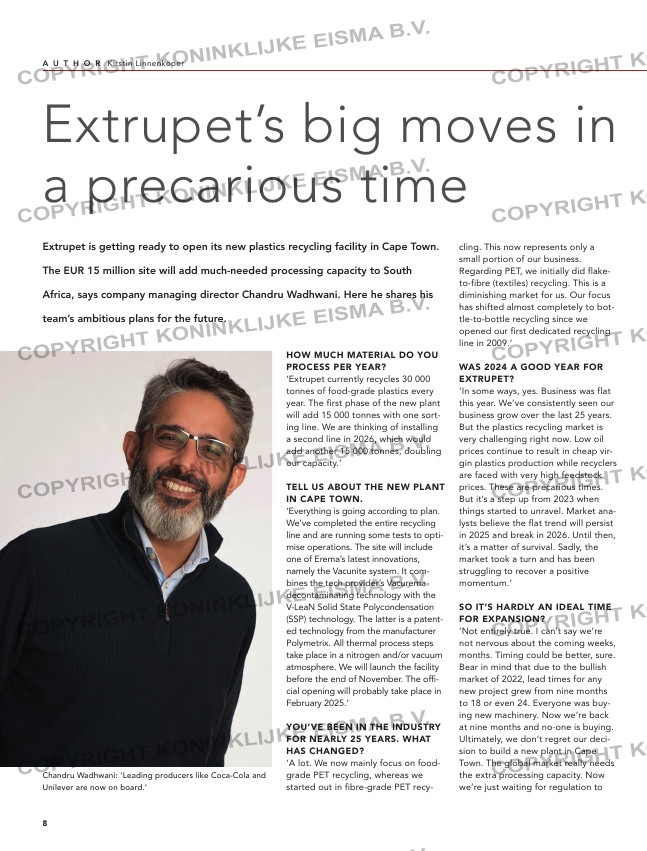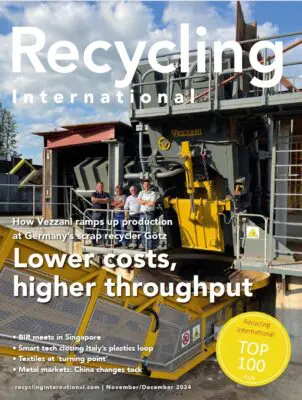Page 8 from: Recycling International November/December issue 2024

8
Extrupet’s big moves in
a precarious time
Extrupet is getting ready to open its new plastics recycling facility in Cape Town.
The EUR 15 million site will add much-needed processing capacity to South
Africa, says company managing director Chandru Wadhwani. Here he shares his
team’s ambitious plans for the future.
push domestic players towards rPET.
Regulations tend to take a bit more
time to take hold here in South
Africa.’
CAN YOU DESCRIBE YOUR FLAG-
SHIP PRODUCT, PHOENIXPET?
‘We launched our PhoenixPET rPET
resin 15 years ago. A positive change
is that it allows us to be circular,
which is a big step forward. And I’m
glad to say that leading producers
like Coca-Cola and Unilever are now
on board. In fact, our rPET is used in
most bottles and other packaging you
come across at the store. The only
exception is microwave products.’
HOW DID PRODUCERS REACT
TO PHOENIXPET WHEN IT FIRST
HIT THE MARKET?
‘Producers did take some convincing, I
remember that well. Our rPET is food-
grade so quality is a not a problem.
We had to prove a couple times over
with various batch tests. Beverage and
food companies are always worried
about their bottom line. They’ve grad-
ually come to appreciate the quality of
PhoenixPET. It’s no secret that produc-
ers are the ones under the most pres-
sure from legislation. This is nudging
them more and more towards recycled
content. It’s a different story for the
local producers we have in South
Africa. I do expect this will change in
our favour since our government made
the inclusion of rPET mandatory since
November 2021.’
HOW WOULD YOU DESCRIBE
THE PLASTICS RECYCLING
INDUSTRY IN SOUTH AFRICA?
‘Our country has a largely informal
sector, notably when talking about
collection. While large recycling hubs
like ours have a growing presence in
the industry, the majority are still rela-
tively small and local players.
Recyclers are also dealing with erratic
power supply and water supply
restrictions. On top of that, recycling
legislation isn’t a big priority. This is
reflected in the funding available for
recycling projects. There are simply
HOW MUCH MATERIAL DO YOU
PROCESS PER YEAR?
‘Extrupet currently recycles 30 000
tonnes of food-grade plastics every
year. The first phase of the new plant
will add 15 000 tonnes with one sort-
ing line. We are thinking of installing
a second line in 2026, which would
add another 15 000 tonnes, doubling
our capacity.’
TELL US ABOUT THE NEW PLANT
IN CAPE TOWN.
‘Everything is going according to plan.
We’ve completed the entire recycling
line and are running some tests to opti-
mise operations. The site will include
one of Erema’s latest innovations,
namely the Vacunite system. It com-
bines the tech provider’s Vacurema
decontaminating technology with the
V-LeaN Solid State Polycondensation
(SSP) technology. The latter is a patent-
ed technology from the manufacturer
Polymetrix. All thermal process steps
take place in a nitrogen and/or vacuum
atmosphere. We will launch the facility
before the end of November. The offi-
cial opening will probably take place in
February 2025.’
YOU’VE BEEN IN THE INDUSTRY
FOR NEARLY 25 YEARS. WHAT
HAS CHANGED?
‘A lot. We now mainly focus on food-
grade PET recycling, whereas we
started out in fibre-grade PET recy-
cling. This now represents only a
small portion of our business.
Regarding PET, we initially did flake-
to-fibre (textiles) recycling. This is a
diminishing market for us. Our focus
has shifted almost completely to bot-
tle-to-bottle recycling since we
opened our first dedicated recycling
line in 2009.’
WAS 2024 A GOOD YEAR FOR
EXTRUPET?
‘In some ways, yes. Business was flat
this year. We’ve consistently seen our
business grow over the last 25 years.
But the plastics recycling market is
very challenging right now. Low oil
prices continue to result in cheap vir-
gin plastics production while recyclers
are faced with very high feedstock
prices. These are precarious times.
But it’s a step up from 2023 when
things started to unravel. Market ana-
lysts believe the flat trend will persist
in 2025 and break in 2026. Until then,
it’s a matter of survival. Sadly, the
market took a turn and has been
struggling to recover a positive
momentum.’
SO IT’S HARDLY AN IDEAL TIME
FOR EXPANSION?
‘Not entirely true. I can’t say we’re
not nervous about the coming weeks,
months. Timing could be better, sure.
Bear in mind that due to the bullish
market of 2022, lead times for any
new project grew from nine months
to 18 or even 24. Everyone was buy-
ing new machinery. Now we’re back
at nine months and no-one is buying.
Ultimately, we don’t regret our deci-
sion to build a new plant in Cape
Town. The global market really needs
the extra processing capacity. Now
we’re just waiting for regulation to
Chandru Wadhwani: ‘Leading producers like Coca-Cola and
Unilever are now on board.’
A U T H O R Kirstin Linnenkoper
08-09_interview.indd 8 19-11-2024 15:26



